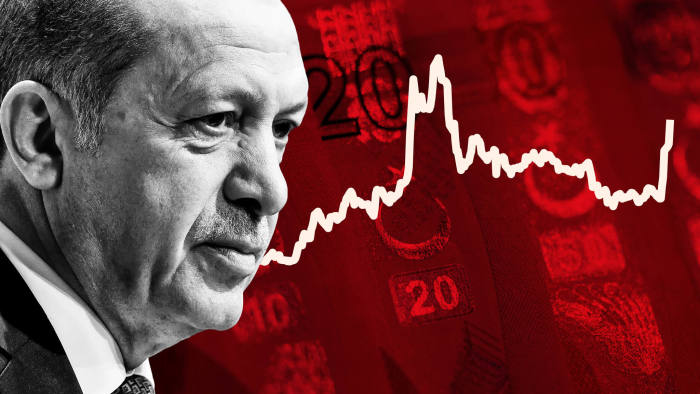Erdogan is no stranger to blaming shadowy foreign influences for tumbles in his national currency
Analysts warn unconventional tactics are compromising nation’s hard-won credibility President Recep Tayyip
The latest ructions in Turkish money markets are prompting fears that the country could be heading for another serious bout of currency weakness, echoing last summer’s lira crisis that has left deep scars on the economy.
Foreign investors were effectively frozen out of selling the lira on Wednesday after the overnight offshore swap rate more than tripled to 1,200 per cent, with analysts saying banks had been ordered not to lend to foreign counterparties — a claim that the Turkish Banking Association has denied. The rate, which sets the cost to investors of exchanging foreign currencies for the lira, had been just 22.6 per cent at the end of last week.
In the short term, the trick has worked: the lira, which fell abruptly at the end of last week, has stabilised. But stocks and bonds have taken a heavy hit, and some investors are trapped in positions they cannot unwind. Meantime, the paralysis in money markets is throwing off worrying signals.
“It’s like a Turkish version of Groundhog Day,” said Tim Ash, an emerging markets analyst at BlueBay Asset Management. Turkey’s leadership, he said, was “repeating the same old mistakes of the past”.
Pressure on the lira started building late last week, after some funds identified signs that the central bank’s official reserves were shrinking — seen as an indication that authorities were trying to support the currency.
“The FX reserves data really spooked the market because it’s evident that reserves are not even enough to cover short-term debt obligations,” said Claire Dissaux, head of global economics and strategy at asset manager, Millennium Global. The lira fell about 6 per cent last Friday.
President Recep Tayyip Erdogan, no stranger to blaming shadowy foreign influences for tumbles in his national currency, lashed out, saying speculators would suffer a “very heavy price” for “trying to provoke us”. Market regulators also launched investigations into JPMorgan, accusing the US investment bank of “misleading” clients with its advice to sell the lira. The probes briefly curtailed the usual flow of financial-market research on Turkey, but they added to the sense that the country is an unfriendly destination for foreign funds.
Analysts said the government could probably maintain its support for the currency until crucial local elections this weekend. But they warned that the unconventional tactics were compromising Turkey’s hard-won credibility at a time when the authorities had been trying to rebuild trust.
“The damage has already been done,” said Piotr Matys, an emerging markets currency strategist at Rabobank.
Mr Erdogan has plenty of form on adopting unorthodox responses to crises. A life-long opponent of high interest rates, which he has termed “the mother and father of all evil”, the Turkish president is widely seen as an overbearing force on the country’s central bank.
Last summer’s brutal decline in the lira has been the driving force behind a rapid increase in inflation, to an annual rate of 20 per cent. In response, Mr Erdogan and his son-in-law, the finance minister Berat Albayrak, deployed unusual attempts to protect voters from the pain, blaming stockpilers for rapid price rises and ordering raids on onion warehouses.
Banks have faced pressure to lend at cheaper rates, and while on the election campaign trail, Mr Erdogan has blamed the country’s woes on a mysterious cadre of foreign powers. Turkish markets had enjoyed a period of relative calm in recent months after the central bank announced — and maintained — a huge rate rise after the decline in the currency last summer. Last Friday, however, the calm cracked. A broad shift out of risky assets globally left Turkey vulnerable, especially in light of the concern over official FX reserves levels and with Turkish citizens loading up on foreign currency.
“Last Friday was a stress test for emerging markets assets and Turkey failed,” said Ed Al-Hussainy, a senior currency analyst at investment house Columbia Threadneedle. With investors spooked by the moves in money markets, Turkish lira bond prices fell on Wednesday, pushing the yield on the benchmark 10-year bond as high as 18.7 per cent.
The Borsa Istanbul 100 stock index, meanwhile, fell 5.6 per cent. One despairing banker compared Mr Albayrak’s attempt to tackle the country’s deep-rooted problems with a game of Whac-A-Mole. “He thinks he is being clever,” said the banker. “But each time one problem is solved, another is created.” Further hurdles lie ahead.
On Thursday, new data on the central bank’s foreign currency reserves will be released, with analysts expecting a further decline. Some investors also fear that a bad result for Mr Erdogan’s Justice and Development party (AKP) in Sunday’s elections could push the Turkish president to adopt more economic populism. “What happens on Monday, especially if we get an anti-AKP result?” said Paul McNamara, an emerging-markets debt fund manager at GAM. “If the lira can drop 6 per cent in a day once, it can do it again.”
Source: FT



